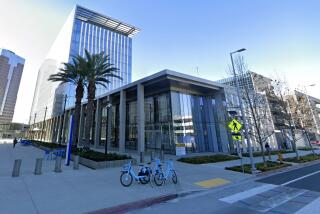Consumers : Record Cold, Record-High Utility Bills
The recent record cold weather in Southern California may set another kind of record for consumers next month--in utility bills. What can you do if you’ve got a $200 gas or electric bill that you just can’t pay all at once? There are, happily, some options.
And some monetary assistance for low income families.
All three utilities--Southern California Gas Co., Southern California Edison and the Los Angeles Department of Water and Power--report that they will work with their customers on a case by case basis to make special arrangements in paying gas or electric bills during this period. Representatives of each utility, though, stress that customers call company service representatives as soon as possible to work out a payment plan, not wait until they receive a turnoff notice.
“We want people to call us as soon as they’re aware it (their bill) is an unmanageable situation,” said the DWP’s James Derry, director of consumer services. “We have a lot more latitude in setting up a payment schedule if they don’t wait until the last minute or until the guy is at the door to shut off the electricity.”
The majority of Southern California residences are heated by gas, but residents in those communities with all-electric homes are likely experiencing their own brand of skyrocketing heating costs.
As a gas company spokesman notes, the principle is simple: “higher gas usage translates into higher gas bills.”
To get a handle on yours, check out the therm usage box on your gas bill this month to see how many units your household is consuming. If you use more than 62 therms of gas a month in the winter, the rate per unit after that increases from 37 cents a therm to 78 cents. That can add up pretty fast.
Electric bills also can creep up more quickly than you realize during unusually cold winter weather, especially if you’re using one of those small, portable electric heaters that doesn’t have a thermostat.
“We have this problem a lot with some of our elderly people,” Derry said. “To save on heating bills for the whole house or apartment, they’ll get one of those small portable heaters without a thermostat, and then it runs constantly 16 hours a day. They weren’t aware, and then they come in with a much bigger bill. It happens every winter when it gets cold. Once we tell them what’s caused the bill to be higher, we rarely have a repeater.
“We advise them to look for the energy rating on the heater and get one with a thermostat so they can set it at a given level and it won’t run constantly,” he added.
One way Southern California Edison has of helping with large bills, especially for its elderly or disabled customers, is a program called “third party notification.”
“A customer can ask us to notify a third party if their bill becomes past due,” explained Suzanne Hughes, supervisor of consumer affairs for Edison. “We send a copy to the designated person who can remind them to pay it or assist with the payment. A pretty large percentage of our customers are using the program.”
Billing Plan
All three utilities also offer an option called a “level pay billing plan” to customers. What this does is average out your bills over a 12-month period so you won’t have a $150 bill one month and a $35 one the next. You can join one of these plans anytime in the first few months of the year, providing you have been a customer for one year. That’s so the company has criteria by which to set an average figure for your bill.
If your bills seem way too high--even considering the cold weather--you should call your utility and request a home energy examination of your house to find out what you can do about conserving energy and lowering your bill. That service is free from each of the utilities.
And if you are a low-income senior citizen, handicapped or disabled person or a family at poverty level income, you may not know you actually can get some monetary help from each utility’s assistance fund for low income customers.
All are administrated by United Way through 127 service agencies in Southern California, among them the Salvation Army, Lutheran Social Services, Catholic Charities, Chinatown Service Center and the Retired Seniors Volunteer Program.
To qualify, you must appear in person at one of the designated agency offices, have a past due bill or turnoff notice and be able to show figures stating your total household income, either monthly or annually.
Basically, you cannot receive assistance if you have income over certain limits set by the federal government. For example, if you’re single, you can’t have income of more than $625 a month or $7,501 a year; for a family of four, the limit is $1,262 a month or $15,145 in a year.
If you are receiving State Supplemental Income (SSI), you automatically qualify for assistance and do not need to have a past due bill. And handicapped or disabled persons who are unable to go to one of the agencies’ offices may authorize a friend or relative to appear for them.
The maximum payment you can get from any of the utility assistance funds is $150 per household per year. Once you qualify, you get a voucher that will pay the specific bill. But according to United Way officials, there is a limited amount of money available for utility bill assistance and the money goes fast because there are so many people who need it.
Last year, Southern California Edison gave assistance to 8,860 households; Southern California Gas Co., 6,828; DWP, 891. Of course, that number of households translates to several thousand people, considering the fact that a household served is usually composed of one to five people.
“We always run out of money, because this is a huge problem,” United Way’s Sal Perrotta said. “These funds are virtually a drop in the bucket, but they do help these agencies who wouldn’t have any other way to assist the people who need help.”
Funds are gathered through customer contributions to all three utilities. Southern California Edison matches its customer contributions dollar for dollar from shareholder funds; the Southern California Gas Co. contributes $250,000 in addition to whatever its customers have given. But the DWP is not permitted to match contributions to its Project Angel (Assist Neighbors by Giving Energy for Living), because it is a rate-payer-owned utility, run by the City of Los Angeles.
Both Southern California Edison and the gas company began their assistance programs this month, but the DWP probably will not begin its annual Project ANGEL program until mid-April--because that program only kicks in after customer contributions have reached $100,000. This year, that will probably be in mid-April and again in October.
“That’s given away in an eight-hour day at five centers throughout the city,” Derry noted.
For additional information about the SoCalGas Gas Assistance Fund, call the gas company office number listed on your bill; for Southern California Edison’s Winter Energy Assistance Fund, call its 24-hour Action Line at (800) 952-5062. For Project ANGEL assistance, call the DWP Hotline in your area: Metropolitan Los Angeles, (213) 481-5800; San Fernando Valley and West Los Angeles, (818) 984-3303; Harbor, (213) 639-9442.
For more information on assistance with utility bills that you may get from federal or state programs for low income families, call Info Line, California’s largest information and referral service.
Ask about the Energy Crisis Intervention Program that is funded with money from the federal government and administered by the state. And families on SSI or Aid to Dependent Children may want to ask about another government plan, Home Energy Assistance Program.
Info Line telephone numbers are: Los Angeles, (213) 686-0950; West Los Angeles, (213) 551-2929; LAX area, (213) 671-7464, South Bay/Long Beach, (213) 603-8962; San Gabriel Valley, (818) 350-6833; Burbank/Glendale, (818) 956-1100; San Fernando Valley, (818) 501-4447; Antelope Valley/Santa Clarita Valley, (800) 422-1535; all other areas, (800) 242-4612.
Consumers living outside Los Angeles also might want to check with their own city governments to see if there are any utility assistance programs.
For example, Pasadena, which has its own department of water and power, just started a utility assistance fund for its customers in February. It’s called Project APPLE--Assisting Pasadena People with Limited Emergencies. Information: (818) 405-4409.
More to Read
Inside the business of entertainment
The Wide Shot brings you news, analysis and insights on everything from streaming wars to production — and what it all means for the future.
You may occasionally receive promotional content from the Los Angeles Times.









